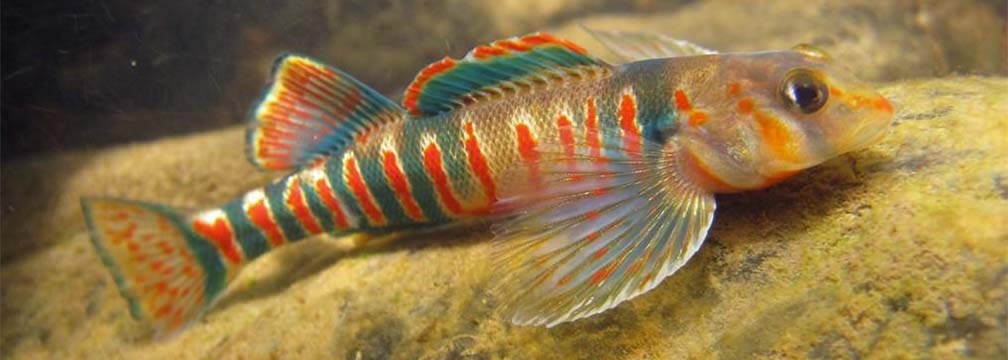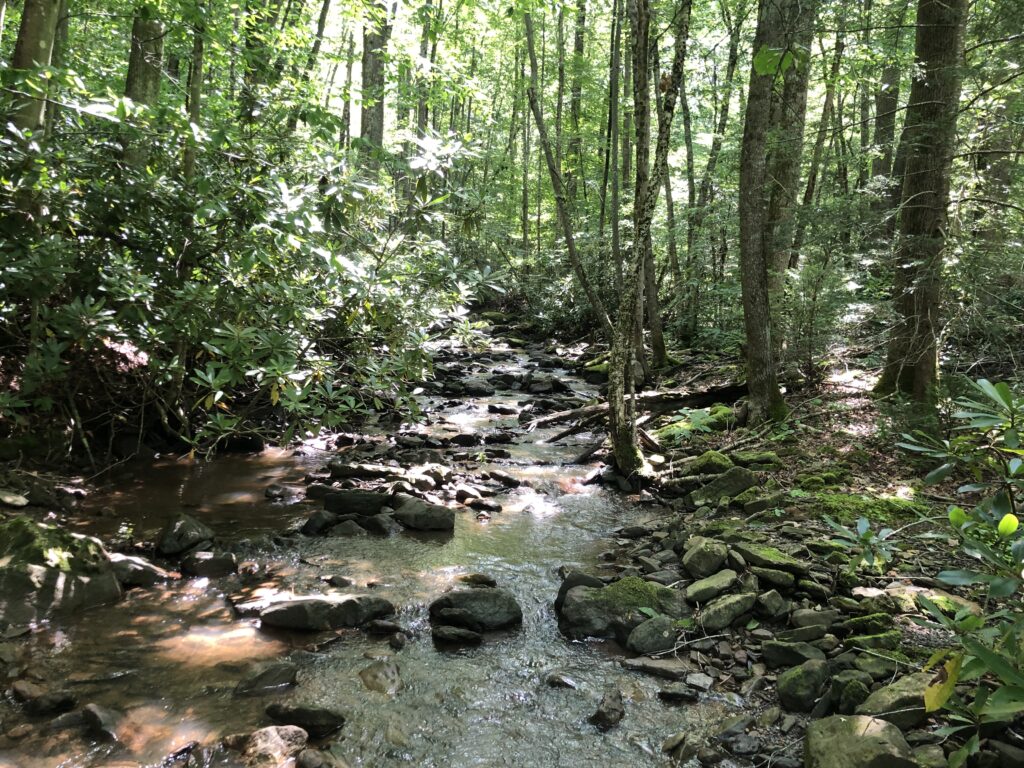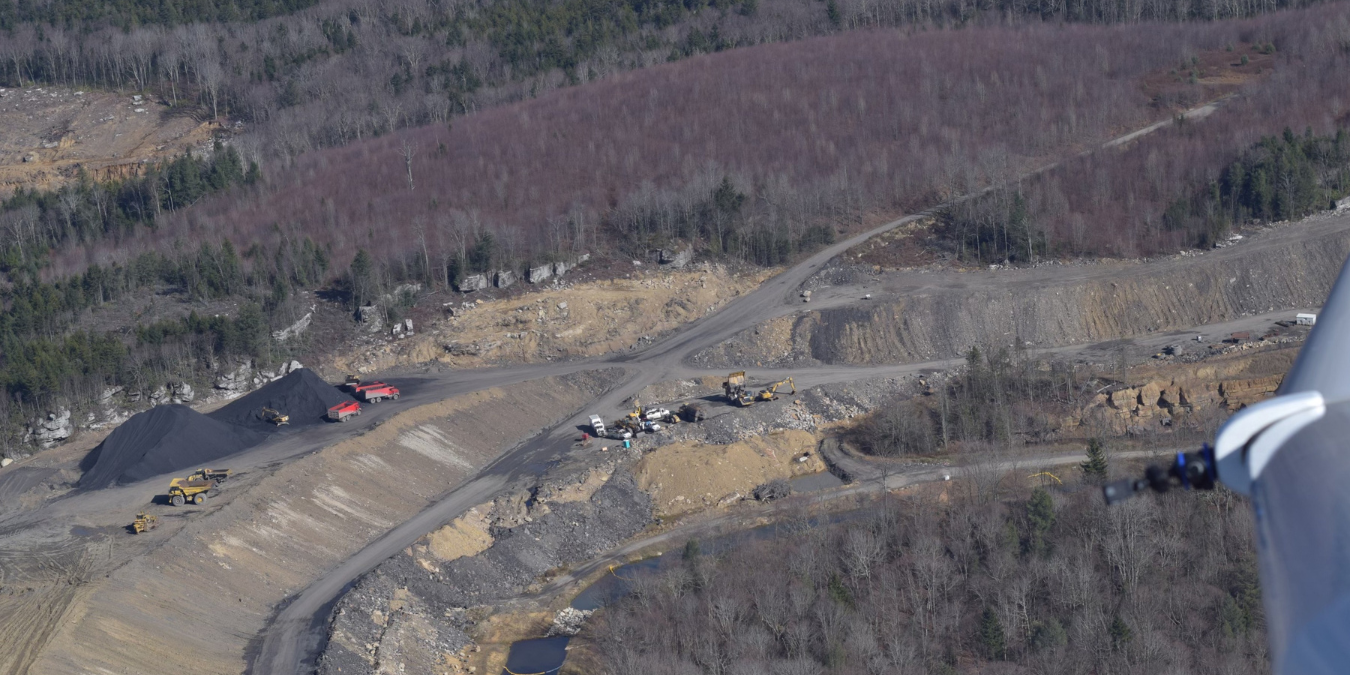By Andrew Young
South Fork Coal Company has an extensive track record of non-compliance with the water protection requirements of Surface Mine and Reclamation Act (SMCRA) across all of its permitted facilities in the South Fork Cherry River and Laurel Creek watersheds. Most recently, at the end of October 2023, South Fork Coal Company was issued a third successive Notice of Violation for spreading raw coal, a toxic pollutant, across the surface of Haul Road #2, which then drains to candy darter critical habitat.
This NOV for spreading raw coal was the third time since April that South Fork Coal Company was issued a violation for the same thing, and as of the last inspection in November there was still coal on the road. This pattern shows the unacceptable lack of professionalism and the superficiality with which the regulators and the company take their obligations under the law.
The manifest harm that the candy darter has suffered due to coal industry pollution underscores the need for the mine operator, West Virginia Department of Environmental Protection, Office of Surface Mining and Reclamation Enforcement (OSMRE), and Fish and Wildlife Service to fashion and effectively implement appropriate Protection and Enhancement Plans (PEPs) and species-specific protective measures (SSPMs). At this time, however, more than 30 months after the issuance of the 2020 BiOp, West Virginia DEP has taken no action to initiate the process of developing PEPs for the candy darter and its designated critical habitat for any SMCRA permitted operation affecting the species in the South Fork Cherry River or Laurel Creek watersheds. This is both surprising and unacceptable because South Fork Coal Company is the only coal company actively operating in candy darter critical habitat, yet none of the company’s relevant SMCRA permitted facilities have PEPs in place for this species.

The “no jeopardy” determination in the 2020 BiOp was premised on state regulatory agencies and mine operators complying with the SMCRA regulations–in particular, the regulations requiring PEPs and SSPMs, and that mining activities not jeopardize listed species–which the Fish and Wildlife Service assumed OSMRE would enforce through its oversight role in states with primacy. Indeed, one of the reasonable and prudent measures (RPMs) in the incidental take statement is that “OSMRE will use its authorities to minimize impacts to listed species through oversight of State… programs.” The fact that OSMRE has failed to ensure that every SMCRA permitted operation that “may affect” listed candy darters have appropriate PEPs in place is a direct violation of the agency’s duties under the 2020 BiOp.
The West Virginia DEP has failed to fulfill its roles with regards to the coordination, PEP, and SSPM requirements of the 2020 BiOp to protect the candy darter for every SMCRA facility that affects the species listed critical habitat. Pursuant to the 2020 BiOp, OSMRE is the authority charged with the enforcement of coordination, PEP, and SSPM requirements against the states. However, based on the publicly available information, OSMRE has failed to utilize enforcement measures against West Virginia or any of the noncompliant SMCRA permits affecting candy darter critical habitat. Consequently, OSMRE has failed to ensure that West Virginia has gotten PEPs approved for SMCRA facilities in these two watersheds before allowing mining activities to move forward that may affect the candy darter or its designated critical habitat, as the 2020 BiOp requires.
OSMRE has failed to insure against jeopardy and adverse modification for listed species and critical habitat via compliance with the substantive provisions of the 2020 BiOp and incidental take statement. Indeed, as explained, to the extent that the 2020 BiOp is able to provide any means to protect the candy darter from jeopardy and adverse modification, it does so via the coordination process described in the BiOp, which is premised on the development of PEPs with SSPMs that OSMRE can enforce.
Therefore, in order for the 2020 BiOp to protect listed species, OSMRE must ensure that the coordination process of the 2020 BiOp is being implemented, with the end result of adequate PEPs and SSPMs produced for each permit that needs them. The failure to do so is a blatant abdication of the agency’s duties under the 2020 BiOp, and thus a clear violation of its duty to ensure against jeopardy, as the Endangered Species Act requires.
Furthermore, due to West Virginia’s failure to effectively implement SMCRA and the 2020 BiOp within its border, OSMRE is under a duty to initiate its SMCRA enforcement procedures against the West Virginia DEP per the terms and conditions of the 2020 BiOp for all relevant mining facilities in candy darter habitat that are lacking Appendix A coordination, PEPs, and SSPMs. Due to the chronic nature of noncompliance in West Virginia, OSMRE may need to substitute its enforcement powers for that of the States’, or, in light of the chronic nonfeasance documented herein, it may need to withdraw its delegation of SMCRA implementation authority altogether.

In sum, by failing to comply with the oversight and enforcement provisions of SMCRA, OSMRE has undermined the provisions of the 2020 BiOp that the Fish and Wildlife Service explicitly relied upon to make its no jeopardy determination and provide safe harbor to SMCRA activities in the states. Thus, OSMRE has failed to fulfill its duties to ensure against jeopardy and adverse modification for the candy darter, in violation of Section 7(a)(2) of the ESA.
With no valid take coverage for the candy darter, OSMRE, West Virginia DEP, and South Fork Coal Company may be subject to liability under Section 9 of the ESA for any take of candy darters. As discussed above, failure to comply with the terms and conditions of the 2020 BiOp and incidental take statement expose the agencies and any private actors to liability.
Here, none of the parties have complied with the terms and conditions of the 2020 BiOp, as they have failed to develop and implement an adequate PEP for the candy darter prior to authorizing or commencing actions that harm the candy darter. West Virginia DEP has failed to provide a timely proposed PEP to FWS; FWS has failed to timely review or help finalize any candy darter PEP from WV DEP; and OSMRE has failed to oversee and enforce proper implementation of Title V of SMCRA by West Virginia DEP. These facilities should be shut down until they can be shown to comply with the law.
In Sum
Ultimately, when you get down to it, there should be no coal mining in this area at all. The restoration and preservation of these watersheds is simply too important for the candy darter and our collective futures to let South Fork Coal Company pillage, pollute, and then run away.
To quote a hero of mine, Judy Bonds, “God made Mountaineers. Man – and greed– made coal [companies]…But we were Mountaineers long before we were coal miners, there was a love and connection to this land long before they went in there and set blasts and dug coal…My mother was never one to shut up about an injustice. My mother always spoke up. My family comes from Scots-Irish heritage – scrappy people– and we don’t shut up. Going back centuries, we fought for our existence… And I’m going to let a coal company destroy that? Why would I do that? We Won’t Shut Up.”
Breaking the resource extraction-based extinction cycle here in the South Fork Cherry River and Laurel Creek can start by all of us Mountaineers choosing to fight for our way of life and a just future that is deeply rooted in the historic defense of place and people. It’s not simply about the mountains or the streams, it’s about our collective existence and moral responsibility to one another as human beings. It’s about speaking truth to a corrupt power that is, and always has been, determined to beat us down as people and destroy the world around us while the money flows away to shareholders in far-off cities. We cannot sit idly by and watch while one coal company poisons the people and creatures below and around them. If we do not fight back when we see this kind of injustice, we are no different than the people at South Fork Coal Company doing the poisoning.
Again, extinction is forever, but it is a choice, and we have the means to stop it. We can change the path we are on, although the hour is getting late. For this to happen, the responsible agencies must finally embrace their moral and legal responsibilities above the wishes of a rogue coal company focused on the almighty dollar. But once the laws are enforced as they should be, the agencies will almost certainly realize this area is unsuitable for coal mining, as it can’t be done within the requirements of the law.
The right thing is for the land to be given back to the American people as part of the Monongahela National Forest. We won’t shut up until that day comes, and we are going to fight tooth and nail for the places, people, and culture that we love. It’s in our blood.
Note: Read part one and part two in this series examining the impacts of coal mining and timbering operations in critical candy darter habitat.

